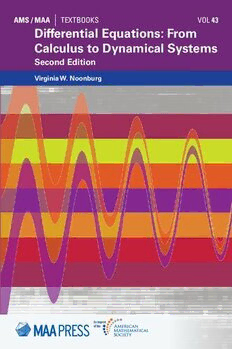
Differential Equations: From Calculus to Dynamical Systems PDF
Preview Differential Equations: From Calculus to Dynamical Systems
AMS / MAA TEXTBOOKS VOL 43 Differential Equations: From Calculus to Dynamical Systems Second Edition Virginia W. Noonburg Differential Equations: From Calculus to Dynamical Systems Second Edition AMS/MAA TEXTBOOKS VOL 43 Differential Equations: From Calculus to Dynamical Systems Second Edition Virginia W. Noonburg CommitteeonBooks JenniferJ.Quinn,Chair MAATextbooksEditorialBoard StanleyE.Seltzer,Editor BelaBajnok CharlesR.Hampton JeffreyL.Stuart MatthiasBeck SuzanneLynneLarson RonD.Taylor,Jr. HeatherAnnDye JohnLorch ElizabethThoren WilliamRobertGreen MichaelJ.McAsey RuthVanderpool 2010MathematicsSubjectClassification.Primary34-01,35-01. Foradditionalinformationandupdatesonthisbook,visit www.ams.org/bookpages/text-43 LibraryofCongressCataloging-in-PublicationData Names: Noonburg,V.W.(VirginiaWalbran),1931–author. |Noonburg,V.W.(VirginiaWalbran),1931– Ordinarydifferentialequations. Title:Differentialequations:Fromcalculustodynamicalsystems/VirginiaW.Noonburg. Othertitles:Ordinarydifferentialequations Description: Secondedition. |Providence,RhodeIsland: MAAPress,animprintoftheAmericanMathe- maticalSociety,[2019]|Series:AMS/MAAtextbooks;volume43|Includesanindex. Identifiers:LCCN2018025154|ISBN9781470444006(alk.paper) Subjects: LCSH:Differentialequations. |AMS:Ordinarydifferentialequations–Instructionalexposition (textbooks,tutorialpapers,etc.).msc|Partialdifferentialequations–Instructionalexposition(textbooks, tutorialpapers,etc.).msc Classification:LCCQA371.N582019|DDC515/.35–dc23 LCrecordavailableathttps://lccn.loc.gov/2018025154 Copyingandreprinting. Individualreadersofthispublication,andnonprofitlibrariesactingforthem, arepermittedtomakefairuseofthematerial,suchastocopyselectpagesforuseinteachingorresearch. Permissionisgrantedtoquotebriefpassagesfromthispublicationinreviews,providedthecustomaryac- knowledgmentofthesourceisgiven. Republication,systematiccopying,ormultiplereproductionofanymaterialinthispublicationispermit- tedonlyunderlicensefromtheAmericanMathematicalSociety.Requestsforpermissiontoreuseportions ofAMSpublicationcontentarehandledbytheCopyrightClearanceCenter. Formoreinformation,please visitwww.ams.org/publications/pubpermissions. Sendrequestsfortranslationrightsandlicensedreprintstoreprint-permission@ams.org. ©2019bytheAmericanMathematicalSociety.Allrightsreserved. TheAmericanMathematicalSocietyretainsallrights exceptthosegrantedtotheUnitedStatesGovernment. PrintedintheUnitedStatesofAmerica. ⃝1Thepaperusedinthisbookisacid-freeandfallswithintheguidelines establishedtoensurepermanenceanddurability. VisittheAMShomepageathttps://www.ams.org/ 10987654321 242322212019 Contents Preface ix Acknowledgments ix 1 IntroductiontoDifferentialEquations 1 1.1 BasicTerminology 2 1.1.1 Ordinaryvs.PartialDifferentialEquations 2 1.1.2 IndependentVariables,DependentVariables,andParameters 3 1.1.3 OrderofaDifferentialEquation 3 1.1.4 WhatisaSolution? 3 1.1.5 SystemsofDifferentialEquations 5 1.2 FamiliesofSolutions,Initial-ValueProblems 6 1.3 ModelingwithDifferentialEquations 11 2 First-orderDifferentialEquations 19 2.1 SeparableFirst-orderEquations 20 2.1.1 Application1: PopulationGrowth 23 2.1.2 Application2: Newton’sLawofCooling 25 2.2 GraphicalMethods,theSlopeField 28 2.2.1 UsingGraphicalMethodstoVisualizeSolutions 32 2.3 LinearFirst-orderDifferentialEquations 36 2.3.1 Application: Single-compartmentMixingProblem 41 2.4 ExistenceandUniquenessofSolutions 44 2.5 MoreAnalyticMethodsforNonlinearFirst-orderEquations 51 2.5.1 ExactDifferentialEquations 51 2.5.2 BernoulliEquations 56 2.5.3 UsingSymmetriesoftheSlopeField 58 2.6 NumericalMethods 59 2.6.1 Euler’sMethod 60 2.6.2 ImprovedEulerMethod 64 2.6.3 Fourth-orderRunge-KuttaMethod 66 2.7 AutonomousEquations,thePhaseLine 71 2.7.1 Stability—Sinks,Sources,andNodes 73 BifurcationinEquationswithParameters 74 3 Second-orderDifferentialEquations 81 3.1 GeneralTheoryofHomogeneousLinearEquations 82 3.2 HomogeneousLinearEquationswithConstantCoefficients 88 3.2.1 Second-orderEquationwithConstantCoefficients 88 v vi Contents 3.2.2 EquationsofOrderGreaterThanTwo 93 3.3 TheSpring-massEquation 95 3.3.1 DerivationoftheSpring-massEquation 95 3.3.2 TheUnforcedSpring-massSystem 96 3.4 NonhomogeneousLinearEquations 102 3.4.1 MethodofUndeterminedCoefficients 102 3.4.2 VariationofParameters 109 3.5 TheForcedSpring-massSystem 114 BeatsandResonance 117 3.6 LinearSecond-orderEquationswithNonconstantCoefficients 125 3.6.1 TheCauchy-EulerEquation 125 3.6.2 SeriesSolutions 127 3.7 AutonomousSecond-orderDifferentialEquations 135 3.7.1 NumericalMethods 136 3.7.2 AutonomousEquationsandthePhasePlane 137 4 LinearSystemsofFirst-orderDifferentialEquations 145 4.1 IntroductiontoSystems 146 4.1.1 WritingDifferentialEquationsasaFirst-orderSystem 146 4.1.2 LinearSystems 147 4.2 MatrixAlgebra 150 4.3 EigenvaluesandEigenvectors 158 4.4 AnalyticSolutionsoftheLinearSystem𝐱⃗′ =𝐀𝐱⃗ 165 4.4.1 Application1: MixingProblemwithTwoCompartments 169 4.4.2 Application2: DoubleSpring-massSystem 171 4.5 LargeLinearSystems;theMatrixExponential 176 4.5.1 DefinitionandPropertiesoftheMatrixExponential 176 4.5.2 UsingtheMatrixExponentialtoSolveaNonhomogeneousSystem 178 4.5.3 Application: MixingProblemwithThreeCompartments 180 5 GeometryofAutonomousSystems 183 5.1 ThePhasePlaneforAutonomousSystems 184 5.2 GeometricBehaviorofLinearAutonomousSystems 187 5.2.1 LinearSystemswithReal(Distinct,Nonzero)Eigenvalues 188 5.2.2 LinearSystemswithComplexEigenvalues 190 5.2.3 TheTrace-determinantPlane 191 5.2.4 TheSpecialCases 193 5.3 GeometricBehaviorofNonlinearAutonomousSystems 198 5.3.1 FindingtheEquilibriumPoints 199 5.3.2 DeterminingtheTypeofanEquilibrium 200 5.3.3 ALimitCycle—theVanderPolEquation 204 5.4 BifurcationsforSystems 207 5.4.1 BifurcationinaSpring-massModel 208 5.4.2 BifurcationofaPredator-preyModel 208 5.4.3 BifurcationAnalysisAppliedtoaCompetingSpeciesModel 211 5.5 StudentProjects 214 5.5.1 TheWilson-CowanEquations 214 5.5.2 ANewPredator-preyEquation—PuttingItAllTogether 218 Contents vii 6 LaplaceTransforms 221 6.1 DefinitionandSomeSimpleLaplaceTransforms 221 6.1.1 FourSimpleLaplaceTransforms 223 6.1.2 LinearityoftheLaplaceTransform 224 6.1.3 TransformingtheDerivativeof𝑓(𝑡) 225 6.2 SolvingEquations,theInverseLaplaceTransform 227 6.2.1 PartialFractionExpansions 228 6.3 ExtendingtheTable 232 6.3.1 InvertingaTermwithanIrreducibleQuadraticDenominator 233 6.3.2 SolvingLinearSystemswithLaplaceTransforms 236 6.4 TheUnitStepFunction 239 6.5 ConvolutionandtheImpulseFunction 251 6.5.1 TheConvolutionIntegral 251 6.5.2 TheImpulseFunction 253 6.5.3 ImpulseResponseofaLinear,Time-invariantSystem 256 7 IntroductiontoPartialDifferentialEquations 261 7.1 SolvingPartialDifferentialEquations 261 7.1.1 AnOverviewoftheMethodofSeparationofVariables 263 7.2 OrthogonalFunctionsandTrigonometricFourierSeries 266 7.2.1 OrthogonalFamiliesofFunctions 266 7.2.2 PropertiesofFourierSeries,CosineandSineSeries 269 7.3 Boundary-ValueProblems: Sturm-LiouvilleEquations 274 8 SolvingSecond-orderPartialDifferentialEquations 285 8.1 ClassificationofLinearSecond-orderPartialDifferentialEquations 285 8.2 The1-dimensionalHeatEquation 289 8.2.1 SolutionoftheHeatEquationbySeparationofVariables 291 8.2.2 OtherBoundaryConditionsfortheHeatEquation 294 8.3 The1-dimensionalWaveEquation 299 8.3.1 SolutionoftheWaveEquationbySeparationofVariables 300 8.3.2 D’Alembert’sSolutionoftheWaveEquationonanInfiniteInterval 305 8.4 NumericalSolutionofParabolicandHyperbolicEquations 309 8.5 Laplace’sEquation 318 8.6 StudentProject: HarvestedDiffusiveLogisticEquation 324 Appendix 329 A AnswerstoOdd-numberedExercises 331 B DerivativeandIntegralFormulas 385 C CofactorMethodforDeterminants 387 D Cramer’sRuleforSolvingSystemsofLinearEquations 389 E TheWronskian 391 F TableofLaplaceTransforms 393 G ReviewofPartialDerivatives 395 Index 397 Preface Thisbookismeantforanyonewhohassuccessfullycompletedacourseincalculusand whonowwantsasolidintroductiontodifferentialequations. Thematerialcontained in the book is the standard material found in a two-semester undergraduate course indifferentialequations,normallytakenbyengineeringstudentsintheirsophomore year. Therearetwobasicdifferencesbetweenthistextandtheothers: first, thereis amuchgreateremphasisonphaseplaneanalysisappliedparticularlytothestudyof bifurcations, and second, a concerted effort has been put forth to make the book as readableaspossible(thinkstudent-centered). Thismeansthatinadditiontobeingan up-to-datetextforthestandardtwo-semestercourseinDEs,itisanobviouschoicefor acoursewhichisbeing”flipped”;itisalsoaveryappropriatechoiceforastudentwho wantstoeitherlearnorreviewdifferentialequationsonhisorherown. IntheprefacetothefirsteditionIemphasizedthatIwouldliketoseeallscience students, not only the prospective engineers, take a course in differential equations earlyintheircareer. Thisappliesaswelltoallofthenewmaterialinthesecondedi- tion. Thetwocompletelynewchaptersonpartialdifferentialequationscontainallof thestandardmaterialonsecond-orderlinearPDEs,includingasectiononFourierse- riesandasectiononSturm-Liouvilleboundary-valueproblems;thereisalsoenough material on numerical solutions to make it possible for students to write their own simpleprogramstosolvethetypeofnonlinearPDEsthatappear,forexample,inpop- ulationbiologyproblems. Acknowledgments. I want to thank all of the people, both at the MAA and the AMS,whohavedonesuchagreatjobinputtingthisbooktogether. Specialthanksare duetomyAMSeditor,BeckyRivard,whoseeffortstomakesurethateverythingwas donerightaregreatlyappreciated. The person most responsible for both the first and second editions of this book beinginprintisStephenKennedy,anditiswithdeepgratitudethatIacknowledgehis helpandencouragement. AtthispointIwouldliketoadmitthatalargeamountofwhatIknowaboutmod- ernengineeringandbiologyistheresultoftalkingwithmytwosons,Derek(acom- puterengineer)andErik(apopulationbiologist). Withmuchappreciation,therefore, thisbookisdedicatedtothem. ix
